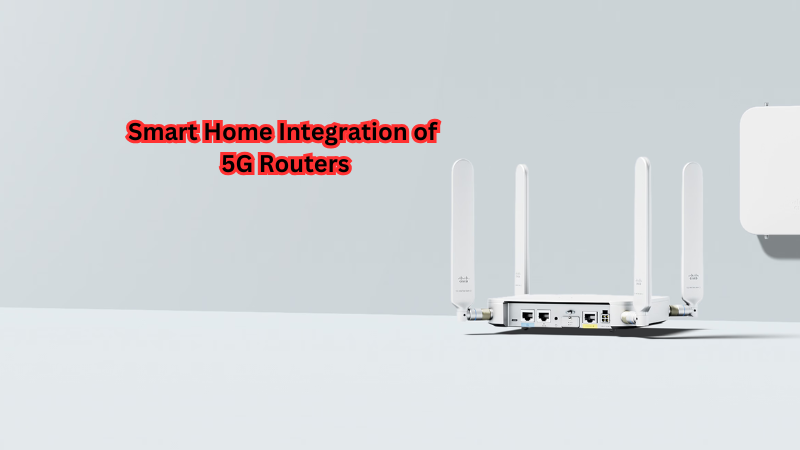With the rapid advancements in technology, it's no surprise that our homes are becoming smarter than ever before. From controlling lights and appliances with a simple voice command to remotely monitoring security cameras, smart home devices have made our lives more convenient and secure.
However, these devices rely heavily on stable internet connectivity to function properly. This is where 5G routers come into play. With their high-speed connectivity and low latency, they provide an ideal solution for smart home integration.
In this document, we will explore the benefits of integrating 5G routers into our smart homes and how this technology is revolutionizing the way we live. From reducing energy consumption to improving home security, let's dive deeper into the world of smart home integration with 5G routers.
What Is a 5G Router?
A 5G router is a wireless device that connects to the internet through a 5G mobile network. It acts as a bridge between your home devices and the internet, allowing them to access data and services through the high-speed 5G network.
Compared to traditional routers, 5G routers have significantly faster download and upload speeds, with some models offering speeds up to 20 times faster than 4G networks. They also have lower latency, which means there is less delay in transferring data between devices.
In addition to their speed and low latency, 5G routers are also more reliable due to their use of multiple bands for connectivity. This means that even in areas with weak 5G coverage, the router can still switch to a stronger band for optimal performance.
Furthermore, most 5G routers also come with advanced features such as dual-band support, multiple Ethernet ports for wired connections, and the ability to connect multiple devices simultaneously. This makes them ideal for smart home integration as they can handle the high bandwidth demands of various connected devices.
What Is Smart Home Integration?
Smart home integration is the process of connecting various devices and systems within a home to create an interconnected network. This allows these devices to communicate and work together, providing a more seamless experience for homeowners.
With smart home integration, you can control multiple devices with a single command or through a centralized hub. For example, you can turn off all the lights in your house by simply saying "Alexa, turn off the lights."
This technology not only provides convenience but also has numerous practical benefits. By integrating devices such as thermostats and lighting systems, you can save energy and reduce utility costs. With security cameras, sensors, and smart locks connected, you can monitor and secure your home remotely.
Benefits of Integrating 5G Routers into Smart Homes
Integrating 5G routers into smart homes can bring numerous benefits to homeowners. Here are some of the key advantages:
High-Speed Connectivity
With 5G routers, smart homes can take advantage of extremely fast internet speeds. This means that streaming high-definition content, video conferencing, and large file downloads can be achieved with minimal lag or buffering.
Whether it's watching your favorite movie on a smart TV or playing online games, the enhanced speed ensures smooth performance.
High-speed connectivity also allows for real-time data transfer between smart devices, enhancing automation processes and ensuring that all connected gadgets function seamlessly, making day-to-day activities more efficient and enjoyable.
Low Latency
Low latency in 5G routers significantly improves the responsiveness of connected smart devices. In smart home environments, quick communication is crucial; for instance, real-time responses on smart security systems can mean the difference between preventing unauthorized access and having delayed information.
Low latency facilitates quicker reactions and commands, supporting smart lighting systems to adjust instantly or security alerts to notify homeowners promptly. This immediate feedback is especially beneficial for time-sensitive systems, enhancing the smart home experience by making it more intuitive and reliable.
Reliable Performance
Reliability is a cornerstone of 5G routers, especially when it comes to smart home integration. Utilizing multiple frequency bands, these routers ensure consistent performance even in areas with weaker signals.
This stability is crucial for devices that require constant connectivity, such as smart thermostats or surveillance cameras.
With reliable performance, homeowners can trust that their smart devices will work without interruption, maintaining the desired temperature in a home or keeping an unbroken watch for security threats, thereby providing peace of mind and convenience.
Ability to Handle Multiple Devices Simultaneously
5G routers are designed to support multiple devices simultaneously without sacrificing performance. This feature is vital as smart homes often have numerous gadgets working concurrently, from smartphones and laptops to smart speakers and security cameras.
By managing the high demand for data, these routers ensure seamless functionality, allowing you to stream, surf, and control smart appliances concurrently.
This capability helps avoid network congestion, providing all connected devices with the bandwidth they need to operate efficiently, enhancing the overall smart home ecosystem.
Cost Savings Through Energy Efficiency
Integrating 5G routers helps maximize smart home energy efficiency, leading to cost savings. Through efficient data management and rapid communication, smart thermostats can adjust heating and cooling based on occupancy, reducing unnecessary energy usage.
Lighting systems connected to motion sensors can dim or turn off automatically, minimizing electricity consumption. This precision in controlling energy use translates into lower utility bills.
By enabling smart devices to operate more efficiently, 5G routers not only contribute to reducing costs but also support environmentally sustainable practices.
Enhanced Security and Remote Monitoring Capabilities
5G routers elevate home security systems, offering robust support for smart locks, cameras, and alarms with enhanced remote monitoring capabilities.
These routers facilitate rapid, secure data transfer through encrypted networks, ensuring that real-time alerts and video streams are promptly delivered to homeowners. This rapid communication allows users to monitor secured areas effectively via smartphone apps, providing immediate responses to potential security threats.
Enhanced security features empower homeowners with greater control and peace of mind, knowing their home can be monitored and secured from virtually anywhere.
So these are some of the key benefits of integrating 5G routers into smart homes. With high-speed connectivity, low latency, reliable performance, and cost savings through energy efficiency, these routers play a crucial role in enhancing the convenience, efficiency, and security of modern homes.
Does A Smart Home Need A 5G Router?
Although not all smart homes necessarily need a 5G router, it can greatly enhance the overall experience and functionality of a smart home.
Having a 5G router will provide homeowners with high-speed connectivity, low latency, reliable performance, and the ability to handle multiple devices simultaneously. These features are essential for maximizing the capabilities of a smart home and ensuring seamless operation.
Furthermore, integrating a 5G router into your smart home can also lead to cost savings through energy efficiency and enhanced security and remote monitoring capabilities.
While some may argue that current Wi-Fi routers are sufficient for powering a smart home, the advanced technology and capabilities of 5G routers make them a valuable addition to any modern household. As we continue to rely more on smart devices in our daily lives, investing in a 5G router can future-proof your home and ensure that it is equipped with the best technology for years to come.
Is A 5G Router Compatible With All Smart Devices?
Generally, 5G routers are designed to be compatible with a wide range of smart devices, including smartphones, laptops, tablets, smart speakers, security systems, and more.
However, it's always essential to check the compatibility of specific devices before purchasing and ensure that both the device and router support 5G connectivity. Some older or less advanced devices may not have the capability to connect to a 5G network.
It's also important to note that while most modern smartphones come equipped with 5G capabilities, not all service providers offer widespread 5G coverage. Therefore, even if you have a 5G router, your area may not have full 5G coverage yet. In this case, the router will still function with 4G or 3G networks but may not provide the same high-speed and low latency benefits of a 5G network.
How To Set Up A 5G Router For A Smart Home
Setting up a 5G router for a smart home is similar to setting up any other Wi-Fi router. Here are the general steps you'll need to follow:
- Connect the router to a power source and turn it on.
- Connect your modem to the WAN port of the router using an Ethernet cable.
- Use another Ethernet cable to connect your device (e.g., laptop) to one of the LAN ports on the router.
- Open a web browser, enter the default IP address of the router in the search bar, and press Enter.
- Log into the router's administration page using your username and password (usually found on the router or in the manual).
- Follow the instructions to configure your network name (SSID) and password.
- Once set up, you can connect all of your smart devices to the 5G Wi-Fi network.
It's always recommended to consult the specific instructions provided by the manufacturer for setting up their particular 5G router model. You may also need to download a mobile app or use a web interface for more advanced configuration options and remote control capabilities.
How Much Does A 5G Router Cost?
The cost of a 5G router can vary widely depending on the brand, features, and specifications.
Generally, prices for consumer 5G routers start around $200 and can go up to $500 or more. High-end models with advanced capabilities, such as multiple Gigabit Ethernet ports and integrated mesh networking features, can be more costly.
Additionally, some manufacturers may offer premium routers with added security features or enhanced performance specifications, which can further increase the price. It is important to consider factors such as coverage, speed, and compatibility with your existing smart home devices when selecting a 5G router.
While the initial investment in a 5G router may seem high, the benefits of increased connectivity, speed, and efficiency can be well worth the cost, making it a valuable addition to a modern smart home.
So these are some of the key things to know about 5G routers and their role in powering a smart home. With advanced features, enhanced security, and high-speed connectivity, these routers can greatly enhance the convenience, efficiency, and overall experience of living in a smart home.
Can You Upgrade Your Existing Router To A 5G Router?
If you already have a Wi-Fi router in your smart home, you may wonder if it's possible to upgrade to a 5G router without having to purchase an entirely new system.
The answer is yes, but it depends on the specifications of your existing router and its compatibility with 5G technology. Some routers may have the capability to upgrade their firmware or hardware to support 5G connectivity, while others may not be able to handle the increased speed and performance demands.
It's best to consult with the manufacturer of your current router or do research online to determine if upgrading is possible. In some cases, investing in a new 5G router may be a more cost-effective option in the long run.
As technology continues to advance, 5G routers are becoming an increasingly popular choice for powering smart homes. With their advanced features and capabilities, they offer numerous benefits that can greatly enhance the overall experience of living in a modern connected household.
Tips For Maximizing The Benefits Of A 5G Router In Your Smart Home
Ther are a few things you can do to ensure that you're getting the most out of your 5G router in your smart home:
- Keep your devices up-to-date: Make sure all of your smart devices have the latest software updates to ensure maximum compatibility and performance with the router. Plus, updates often include bug fixes and security patches.
- Position your router strategically: Placing your router in a central location can help ensure that all of your devices receive strong and stable 5G signal. Avoid placing it near large objects or obstructions that may interfere with the signal.
- Use secure passwords: With the increased connectivity of a 5G network, it's even more important to have strong and secure Wi-Fi passwords to protect against potential cyber threats.
- Consider adding a mesh network: If you have a larger home or experience poor coverage in certain areas, consider adding a mesh network system to your 5G router for extended coverage and improved performance.
- Regularly monitor your network: Keep an eye on your 5G network's performance and troubleshoot any potential issues that may arise. This can help ensure smooth operation and optimal performance for all of your smart devices.
By following these tips, you can make the most out of your 5G router and enjoy a seamless and efficient experience in your smart home. With fast speeds, low latency, and enhanced security, a 5G router is a valuable investment for any modern household.
FAQs
Is a 5G router necessary for a smart home?
While not necessarily required, a 5G router can greatly enhance the connectivity, speed, and efficiency of a smart home. With more devices connected and higher demands for data transfer, a 5G router can provide the necessary bandwidth to support all of your smart devices.
Can I use a 5G router with non-5G devices?
Yes, you can still connect non-5G devices to a 5G router. However, those devices will not be able to access the full capabilities and speeds of the network. They will simply run on their own supported connection (e.g., 2.4GHz or 5GHz).
Can I use a 5G router with my existing internet service provider?
Yes, you can use a 5G router with any internet service provider. However, to take full advantage of the 5G network, you may need to upgrade your current plan.
Are there any potential health risks associated with using a 5G router?
There is currently no evidence to suggest that using a 5G router poses any significant health risks. However, it's always recommended to follow safety precautions and limit exposure to electromagnetic radiation by keeping devices at a safe distance and turning off Wi-Fi when not in use.
Conclusion
In conclusion, a 5G router is an essential component for powering a smart home in today's technological landscape.
With its advanced features, fast speeds, and enhanced security, it offers numerous benefits that can greatly improve the overall experience of living in a connected household.
By understanding the key factors to consider when selecting a 5G router and following tips for maximizing its performance, you can ensure that your smart home is running at its best capacity. So why wait? Upgrade to a 5G router and take your smart home to the next level!







